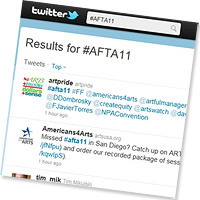
Ron Evans
The Top-50 Tweets from #AFTA11: Part Two
Posted by Jul 22, 2011

Ron Evans
 So, I’ve gone through the entire stream of tweets using the hashtag #AFTA11 (all 2389 of them!) cut out all fat, and filtered them down to my picks for the top 50 most-useful tweets to me from this year's Americans for the Arts Annual Convention. I say most useful because I wanted to separate out things that can be acted on, resources/measurements that can be explored, impactful facts and figures, and new “lightbulb ideas.”
So, I’ve gone through the entire stream of tweets using the hashtag #AFTA11 (all 2389 of them!) cut out all fat, and filtered them down to my picks for the top 50 most-useful tweets to me from this year's Americans for the Arts Annual Convention. I say most useful because I wanted to separate out things that can be acted on, resources/measurements that can be explored, impactful facts and figures, and new “lightbulb ideas.”
Here are the second half of my picks for the 50 top tweets from AFTA 2011:
26. @GordonJayFrost The #afta11 sessions on #philanthropy will be available on-demand: http://t.co/id3vwYc
27. @SheWhoTravels Go Marcus! RT“@artfulmanager Sidewalk Poetry project in St. Paul. Turning concrete into canvas. Wow. #afta11 http://t.co/b6mcrgK”
28. @trishamead oooh. Direct link to mobil-ready video trailer? I’m thinking how to maximize QR code on coffee s hop poster, i.e. #2amt #afta11
29. @crystalewallis oooh! RT @wkradio: #AFTA11 DO NOT be fooled into using QR Codes >>> Excellent design will always transmit more information. #techfads
Read More












